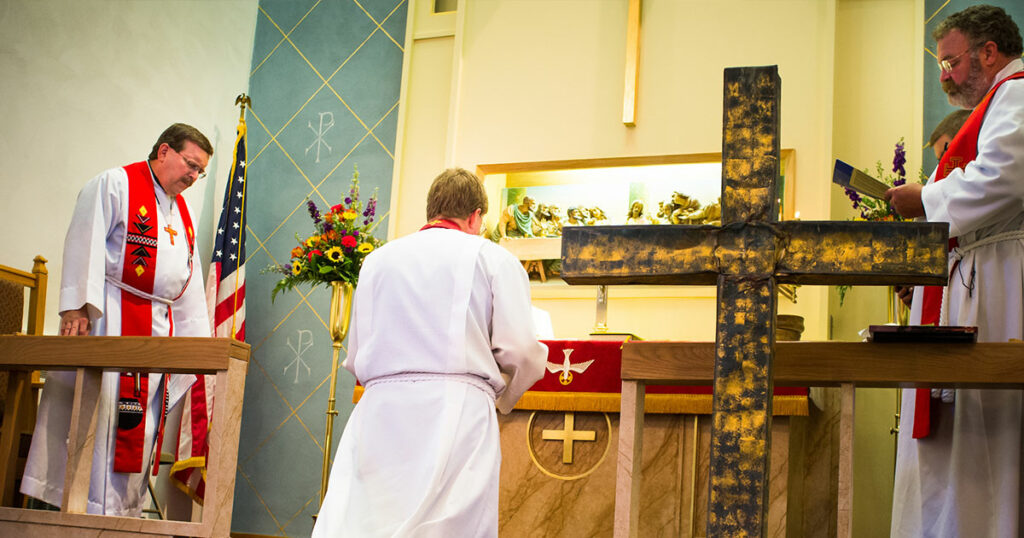One of the simplest and most eloquent explanations of Christian worship was written by Norman Nagel in the preface of the hymnal, Lutheran Worship: “Our Lord speaks and we listen … The rhythm of our worship is from him to us, and then from us back to him. He gives his gifts, and together we receive and extol them. We build one another up as we speak to one another in Psalms, hymns and spiritual songs.”[1] In the Divine Service, God comes to man and blesses him with His gifts through the pastor who is called to be in the stead of Christ. In the midst of tragic events, broken humanity needs God’s blessing more than ever. Nowhere are people closer to the presence of God than when they are in the Divine Service where Christ is bodily present with a special promise to bless and forgive.
Tragic events—including the death of a loved one, a grave medical diagnosis or a catastrophic natural disaster—peel back the façade that covers this broken world. Tragedy often allows people to see with greater clarity the destructiveness of a fallen world and sin’s consequences. Yet, despite brokenness, Christ invites His people, “Come to me, all who labor and are heavy laden, and I will give you rest” (Matt. 11:28). In the Divine Service, God comes to man and blesses him so that humanity can have spiritual rest in Him. As the service begins with a confession of sin, people understand their need for forgiveness and then receive the grace of God. The pastor, who stands in the stead of Christ and in front of His sheep, is a powerful comfort and reminder of God’s presence in the midst of the storms of this world. There is nothing sweeter than to hear the love, grace, and mercy of God spoken into one’s ears. The absolution is the declaration of God’s forgiveness, a gift of God’s peace and a reminder that He is with His people despite the catastrophe they may be experiencing.
After the terrorist attacks in the United States on Sept. 11, 2001, which killed and injured thousands, American church attendance swelled for a few months. People flocked to hear God’s Word preached to them. In times of tragedy, pastors are called to clearly preach the Law, even if death and destruction may be all around them, even if they are surrounded by caskets. In a crisis, the laity need to understand the cause of the brokenness of this world from God’s perspective; nothing should be taken for granted. If the hearers do not understand the spiritual significance and the causes of sin and destruction, they will have a weakened sense of the comfort that the Gospel gives and they will place little hope in the resurrection.
Nowhere on earth are we closer to God than when we stand or kneel before the altar and receive the body and blood of Christ given for the ongoing forgiveness of our sins. When Christians receive the body and blood of Christ, they are connected to Christ (1 Cor. 10:16–17). They are connected to Him despite the chaos of this world. Communion is a powerful comfort in a world that provides very little hope or consolation. The Lord’s Supper is where God is actively giving grace, mercy, and forgiveness; and the parishioner is passively receiving blessing, strength, forgiveness, and encouragement from God Himself.
Through Lutheran hymnody members sing theologically rich songs that bring hope and consolation. Since these hymns are based on scriptural truths, they bring spiritual comfort. Hymnody is a beautiful and powerful way to express deep scriptural truths in a memorable way to Christians of all ages. It allows Christians to rejoice after receiving the body and blood of Christ with a song of praise and can help remind them of scriptural truth such as, “nothing in my hand I bring, simply to thy cross I cling.”[2]
At the close of the Divine Service, the entire congregation is reminded once more that they are blessed and at peace with God. The last words that the congregation hears are pure grace, “The Lord bless you and keep you. The Lord make His face shine upon you and be gracious unto you. The Lord lift up His countenance upon you and give you peace.”[3] Once again the believer is a passive recipient and the Lord is the One who blesses and proclaims His love. The Christian simply receives and responds, “Amen.” The Lutheran service allows the believer to be comforted in the confidence that he is loved by his Lord, despite his own sin and despite what is happening in his life around him.
[1] Lutheran Worship, 6.
[2] Lutheran Service Book, “Rock of Ages, Cleft for Me,” 761.
[3] Lutheran Service Book, 202.

